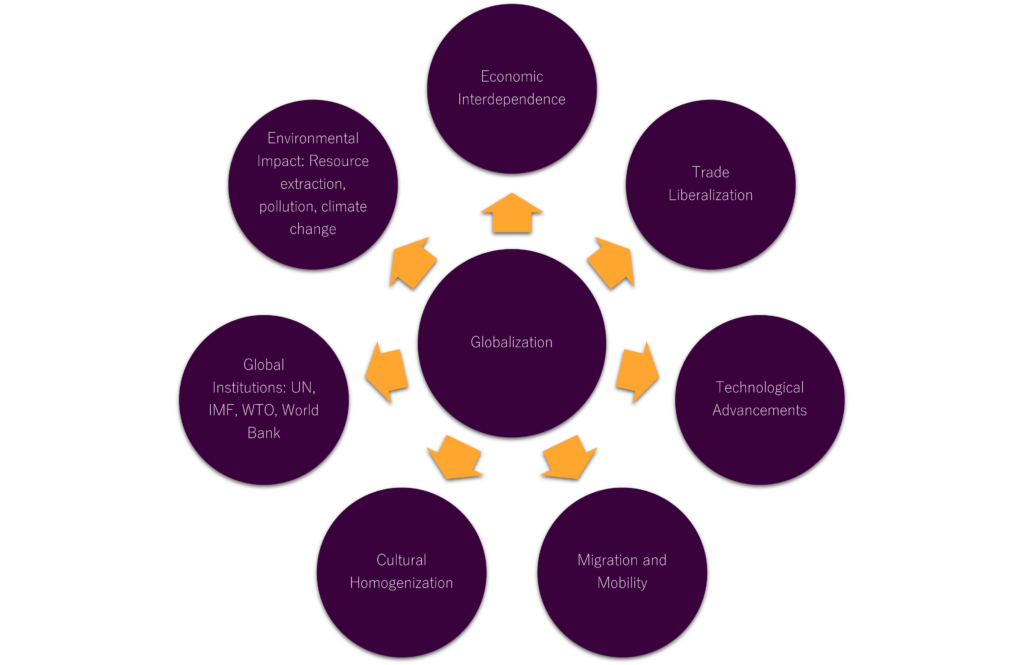Globalization implies the interconnectedness and integration of economies, cultures, and societies worldwide. furthermore, it is driven by advancements in technology, communication, transportation, and trade. Globalization allows goods, services, information, ideas, and people to move more freely and rapidly across borders. Hence, almost every globalization definition defines it in terms of integration among the economies and countries.
Econometrics Tutorials with Certificates
Globalization: Definitions
“Globalization refers to the growing economic interdependence of countries worldwide through the increasing volume and variety of cross-border transactions in goods and services and of international capital flows, and also through the more rapid and widespread diffusion of technology.”
International Monetary Fund (IMF): “World Economic Outlook, A Survey by the Staff of the International Monetary Fund”, “Meeting the Challenges of Globalization in the Advanced Economies”, in the World Economic and Financial Surveys, 1997, p. 45
“Globalization can be defined as a set of economic, social, technological, political and cultural structures and processes arising from the changing character of the production, consumption and trade of goods and assets that comprise the base of the international political economy”
United Nations Educational, Scientific and Cultural Organization (UNESCO), MOST Annual Report 2001
“In a general sense, the increasing worldwide integration of economic, cultural, political, religious and social systems.”
Dictionary of Economics – Fourth Edition, John Black, Nigar Hashimzade and Gareth Myles, Oxford University Press
Different Dimensions of Globalization
In all the definitions above, we see some common terms being used which help us understand the concept better:
- Economic globalization: This involves the increasing flow of goods, services, capital, and investments across national borders. Hence, it implies the growth of multinational corporations, international trade agreements, and the expansion of financial markets.
- Cultural globalization: This refers to the exchange and spread of cultural practices, values, ideas, and norms across different societies. It is further facilitated by the global circulation of media, entertainment, literature and fashion.
- Technological globalization: Moreover, advancements in information and communication technologies have played a crucial role in accelerating globalization. The internet, mobile phones, social media, and other digital platforms have also made it easier for people to connect, collaborate, and access information globally.
- Political globalization: This involves increasing interdependence and cooperation among nations in addressing global challenges. These challenges often include climate change, terrorism, human rights, and trade regulation. International organizations like the United Nations, World Trade Organization, and International Monetary Fund also play significant roles in shaping global governance and policy.
Features of Globalization

Economic Interdependence
One of the central features of globalization is the deepening economic interdependence among countries. This is further seen through the increasing volume and variety of cross-border trade in goods and services. For example, World merchandise exports increased from 59 billion dollars in 1948 to 18372 billion dollars in 2019 (Source: World Trade Statistical Review 2020, WTO). Moreover, we also observe it through an increase in the international capital flows. Economic interdependence means that events in one part of the world can have far-reaching effects on other economies. For example, a financial crisis in one country can quickly spread to others through interconnected financial markets.
Trade Liberalization
Globalization has also been accompanied by efforts to reduce barriers to international trade and promote trade liberalization. This has been achieved through initiatives such as multilateral trade agreements (such as the World Trade Organization), regional trade blocs (such as the European Union, NAFTA), and bilateral trade agreements between countries. Trade liberalization aims to increase the flow of goods and services across borders, enhance economic efficiency, and further promote economic growth. In 1991, world FDI inflows were around 205 billion dollars which increased to 1540 billion dollars in 2019 (Source : World Investment Report, 2020, UNCTAD). However, it has also raised concerns about job displacement and widening income inequality in some countries.
Technological Advancements
Advances in information and communication technologies have played a pivotal role in globalization. Technologies such as the internet, mobile phones, social media, and e-commerce have facilitated the rapid exchange of information, ideas, and data across borders. As a result, these technological advancements have transformed the way businesses operate, facilitated global supply chains, empowered individuals to connect and collaborate across distances, and accelerated the pace of innovation.
Migration and Mobility
Globalization has led to increased human mobility. This further includes labour migration, international tourism, and the movement of skilled professionals. According to the World Tourism Barometer, International tourist arrivals were as high as 1461 million in 2019, which increased from 952 million in 2010. People also migrate in search of better economic opportunities, education, healthcare, and quality of life. Therefore, migration patterns have become more complex and diverse, with individuals moving between countries for various reasons. It has both positive and negative effects, contributing to cultural diversity, demographic changes, and economic growth. On the other hand, it also raises challenges related to social integration, labour market dynamics, and human rights.
Cultural Homogenization
Globalization has facilitated the spread of cultural practices, values, and symbols across borders, leading to the homogenization of cultures. Cultural homogenization refers to the tendency for certain aspects of culture to become standardized or uniform across different societies, driven by global media, entertainment, and consumerism. At the same time, globalization has also fostered cultural hybridization, as cultures interact, blend, and adapt to influences from other parts of the world, resulting in new forms of cultural expression and identity.
Global Institutions
Globalization has led to the emergence of new forms of institutions to address transnational challenges and regulate global interactions. International organizations such as the United Nations, World Bank, International Monetary Fund, and World Trade Organization play key roles in shaping global governance. They help set up norms, and standards, and coordinate collective action on issues such as climate change, poverty alleviation, and human rights. However, the effectiveness and legitimacy of global governance institutions remain subject to debate.
Environmental Impact
Globalization also has significant environmental implications. This includes increased resource extraction, pollution, deforestation, and climate change. Therefore, the expansion of global trade and production networks has led to heightened environmental pressures. As goods are transported across long distances, natural habitats are disrupted and carbon emissions rise.
Advantages of Globalization
Economic Growth
Globalization has facilitated increased trade, investment, and integration of economies, further leading to higher levels of economic growth and development. Access to larger markets allows businesses to expand their operations, create new opportunities for entrepreneurship, and also drive innovation.
Increased Productivity and Efficiency
Globalization also encourages specialization and the efficient allocation of resources, leading to higher productivity levels. Hence, businesses can focus on their core competencies and take advantage of comparative advantages in different countries, resulting in cost savings and improved efficiency.
Technological Innovation
Globalization fosters the spread of technology and knowledge across borders, therefore, accelerating innovation and technological advancement. Collaboration between researchers, scientists, and entrepreneurs from different countries also leads to the development of new products, processes, and technologies that benefit society.
Access to Goods and Services
Globalization has expanded consumer choices by increasing access to a wide range of goods and services from around the world. Consumers can benefit from lower prices, greater variety, and higher quality products due to increased competition and trade liberalization.
Job Creation and Poverty Reduction
Globalization has also contributed to job creation and poverty reduction by stimulating economic growth, investment, and employment opportunities. Foreign direct investment (FDI) and international trade have created millions of jobs in developing countries, hence, lifting millions of people out of poverty. According to the World Bank, almost 2000 million people lived below the poverty line in 1990. This reduced to 712 million people below the poverty line in 2022.
Cultural Exchange and Diversity
Globalization further promotes cultural exchange and understanding by facilitating the flow of ideas, values, and traditions across borders. Exposure to diverse cultures, languages, and perspectives enriches societies and fosters tolerance, respect, and appreciation for cultural diversity.
Improvements in Education and Healthcare
Globalization has enabled the transfer of knowledge, expertise, and best practices in education and healthcare. Collaboration between institutions, researchers, and healthcare professionals from different countries has led to advancements in medical treatments, disease prevention, and educational methods, improving overall human well-being. The world literacy rate has increased from 77% in 1975 to almost 93% in 2022 (Source: World Bank) and Globalization is one of the important factors behind this.
Disadvantages of Globalization
Increased Economic Inequality
Globalization has led to widening income inequality within and between countries. While it has created opportunities for economic growth and wealth accumulation for some, it has marginalized others. This is particularly true for low-skilled workers and vulnerable populations. The concentration of wealth and resources in the hands of a few can exacerbate social disparities and undermine social cohesion. In 2022, the top 1% of the population accounted for 19% of income and 38% of total wealth. Top 10% held as high as 52% of the income and 76% of the wealth (Source: World Inequality Database).
Job Displacement
Globalization has resulted in the outsourcing of jobs to countries with lower labour costs. This has led to job displacement and unemployment in certain industries and regions. For example, USA’s trade deficit with China between 2001 and 2013 led to the elimination or displacement of 3.2 million jobs, out of which 2.4 million were from the manufacturing sector (Source: China Trade, Outsourcing and Jobs). Technological advancements and automation have further accelerated this trend, reducing the demand for labour in traditional sectors and contributing to structural unemployment and income insecurity for workers.
Exploitation of Labor
In pursuit of lower production costs, multinational corporations may exploit labour in developing countries by paying low wages, providing poor working conditions, and also disregarding labour rights and protections. This exploitation can perpetuate cycles of poverty and exploitation, particularly among vulnerable populations such as migrant workers and women. According to Global Estimates of Modern Slavery by ILO, around 40 million people were victims of modern slavery which included 25 million in forced labour and 15 million in forced marriage.
Environmental Degradation
Globalization has also contributed to environmental degradation through increased resource extraction, pollution, and carbon emissions associated with global trade and production networks. The pursuit of economic growth and profit often comes at the expense of environmental sustainability. It often leads to deforestation, habitat loss, air and water pollution, and climate change. Hence, these issues pose significant risks to ecosystems and human health.
Loss of Cultural Identity
Globalization has led to the spread of Western cultural values, norms, and consumer products, resulting in cultural homogenization. This has, therefore, caused the erosion of local traditions and identities. As a result, indigenous cultures and languages are at risk of extinction as they come into contact with dominant global cultural influences, leading to concerns about cultural imperialism and loss of cultural diversity.
Threats to Sovereignty and Democracy
Globalization has empowered multinational corporations at the expense of national sovereignty and democratic governance. Transnational corporations may wield significant influence over governments and policymaking processes, hence, prioritizing profit motives over the public interest. Trade agreements and international financial institutions may impose economic policies that undermine democratic decision-making and further exacerbate social inequalities.
Vulnerability to Global Economic Shocks
Interconnected global markets and financial systems also make countries more vulnerable to economic shocks and crises. Financial contagion, currency fluctuations, and speculative bubbles can spread rapidly across borders, leading to financial instability, market volatility, and economic recessions with far-reaching consequences for businesses, workers, and governments. The housing bubble and the Economic Crisis of 2008 is a recent example of this problem.
Health Risks and Pandemics
Globalization has facilitated the rapid spread of infectious diseases and pandemics by increasing human mobility and interconnectedness. Emerging infectious diseases such as COVID-19 highlight the vulnerabilities of globalized societies to health risks. This has further emphasized the need for international cooperation and preparedness in addressing global health challenges.
India and Globalization
India has experienced significant effects from globalization, especially since the New Economic Policy of 1991. This has profoundly influenced its economy, society, culture, and politics.
Economic Liberalization
India embarked on a path of economic liberalization and globalization in the early 1990s. This involved dismantling trade barriers, opening up the economy to foreign investment, and also pursuing market-oriented reforms. Hence, the liberalization measures aimed to integrate India into the global economy, attract foreign capital, stimulate economic growth, and enhance competitiveness.
Foreign Direct Investment (FDI)
India has emerged as an attractive destination for foreign investment, particularly in sectors such as information technology, manufacturing, pharmaceuticals, and services. Foreign companies have established a significant presence in India, contributing to job creation, technology transfer, and economic development.
Information Technology (IT) and Outsourcing
India has also become a global hub for IT services and outsourcing, with companies providing software development, back-office operations, and business process outsourcing (BPO) services to clients worldwide. The IT industry has propelled India’s economic growth, generated employment opportunities, and also positioned the country as a key player in the global digital economy.
Trade and Export Growth
Globalization has expanded India’s trade relations with other countries, leading to increased exports and imports. India’s exports include a diverse range of goods and services, including textiles, automotive products, software, and pharmaceuticals. Hence, trade growth has facilitated economic integration and enhanced India’s competitiveness in global markets.
Urbanization and Industrialization
Globalization has fueled urbanization and industrialization in India, with rapid growth in cities and industrial centres. Urban areas have become hubs of economic activity, innovation, and employment opportunities, attracting migrants from rural areas in search of better livelihoods. Industrial sectors such as manufacturing, construction, and services have expanded, contributing to economic growth and structural transformation.
Social and Cultural Changes
Globalization has brought about social and cultural changes in India, influencing lifestyles, values, and cultural practices. Increased exposure to global media, entertainment, and consumer products has led to the adoption of new trends and behaviours among Indian youth. However, globalization has also sparked debates about cultural identity, authenticity, and the preservation of traditional values.
Challenges and Inequalities
Despite the benefits of globalization, India faces challenges related to poverty, inequality, and social exclusion. Globalization has widened income disparities between urban and rural areas, as well as between different socioeconomic groups. Marginalized communities, including farmers, informal workers, and tribal populations, have often been left behind in the process of economic globalization.
Environmental Impacts
Globalization has contributed to environmental degradation in India, with increased industrialization, urbanization, and resource extraction leading to pollution, deforestation, and habitat loss. India faces challenges related to air and water pollution, waste management, and climate change, necessitating sustainable development practices and environmental regulation.
Econometrics Tutorials with Certificates
This website contains affiliate links. When you make a purchase through these links, we may earn a commission at no additional cost to you.


